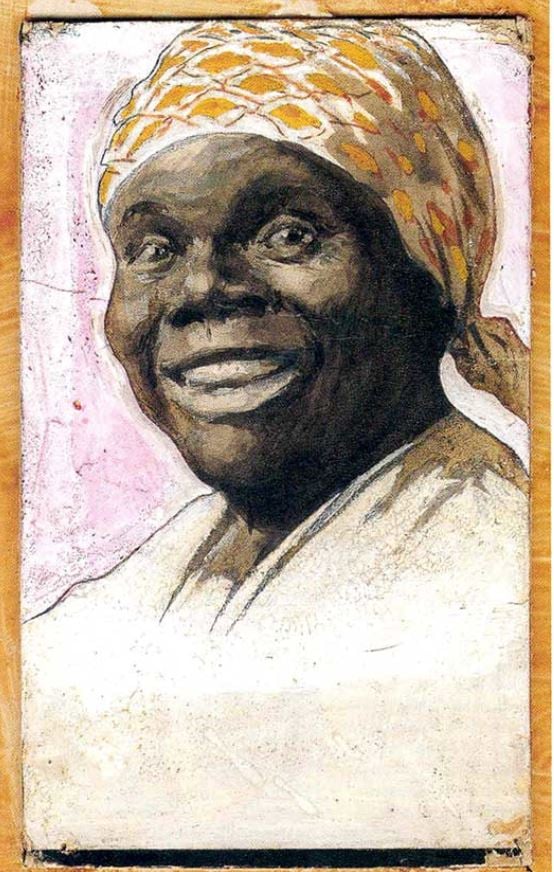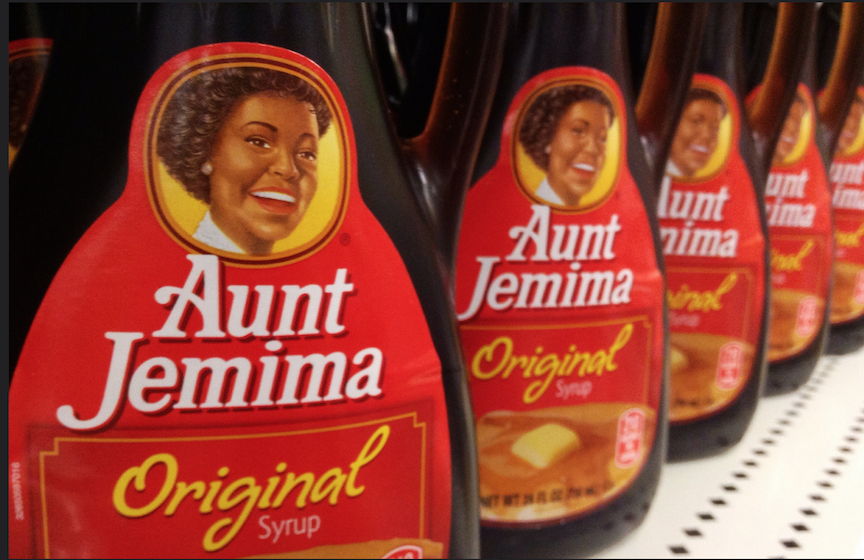When I was a kid, there was always a bottle of Aunt Jemima syrup and a box of pancake mix in the cupboard. On pretty much every childhood birthday I can remember, I would request chocolate chip pancakes and then proceed to drench them in Aunt Jemima syrup. It's making me hungry thinking about it right now. On the other hand, even as a 10-year-old, I knew there was something weird about the brand's name and spokeswoman. Without knowing anything about the corporate history, the image clearly seemed slightly racist. Fast forward to the present, and after 100+ years of serving as the brand's image and namesake, in 2021, Quaker Oats announced it was rebranding away from Aunt Jemima. Today, the brand is called the Pearl Milling Company.
That news probably brought mixed feelings to the relatives of the real-life Aunt Jemima. On the one hand, they might miss seeing their distant great-great relative on grocery shelves around the world. On the other hand, they long contended that the family had never been properly compensated for that usage. I mean, if you're gonna turn my great-great-grandmother into an arguably racist brand icon, the least a company could do is pay me a ton of royalties…
Tensions over the image usage boiled over in 2014 when a group of distant Aunt Jemima family members sued Quaker Oats and parent company PepsiCo, seeking $3 BILLION in damages over unpaid royalties and image licensing fees. Damages they arguably deserved…
Aunt Jemima History
The concept of "Aunt Jemima" dates back nearly 150 years, decades before the syrup or pancake mix existed. Back in the late 19th century, Aunt Jemima was a popular minstrel show character. For those of you who do not know, a minstrel show was a form of entertainment popular after the Civil War where white actors would dress up in blackface to act out skits that today we would consider horrendously racist.
In 1875, a song from one such minstrel show titled "Old Aunt Jemima" was recorded by an African American songwriter named Billy Kersands. When the song was performed during shows, Aunt Jemima would be portrayed by a white man in blackface who acts out stereotypes of a female former slave who is now a cook.
In 1889, two actors convinced the Peal Milling Company to use their version of Aunt Jemima as a pancake mix spokeswoman. This first iteration was a failure, and soon, the Pearl Milling Company was sold to the Randolph Truett Davis Milling Company in St. Joseph, Missouri.
The R.T. Davis Milling Company hired a real-life former slave named Nancy Green to act as the spokeswoman for the newly launched "Aunt Jemima" pancake mix. In 1913, the R.T. Davis Milling Company changed its name officially to "Aunt Jemima Mills." Here's an artist's rendering of Nancy Green's version of Aunt Jemima:

Public Domain
Over the next 33 years, from 1890 until her death in 1923, the real-life Nancy Green worked as "Aunt Jemima". Nancy would conduct pancake seminars at fairs and travel to towns across America to spread the word about the pancake mix.
In 1926, Quaker Oats acquired the Aunt Jemima Mills company. No real-life person was used as an Aunt Jemima for the next decade. A woman named Anna Robinson played the character for Quaker Oats from 1933 to 1935 until she was replaced by a woman named Anna Short Harrington.
Anna Short Harrington
Anna Short Harrington was discovered by Quaker Oats executives at a cooking fair where she had won praise for her own homemade pancake mix. She was exactly what they were looking for in a spokeswoman. Anna was hired on the spot as the company's new full-time real-life Aunt Jemima, and within months, an ad featuring Anna appeared in the magazine Woman's Home Companion. The company also started using her recipe for mass production of their mix. She was paid a modest salary for her role, which allowed her to purchase a small home in Syracuse, New York, where she lived until she died in 1955.
In 1937, Quaker Oats filed for a trademark for the brand. This is important: In their trademark application, they included a photo of Anna Short Harrington dressed up as Aunt Jemima.
Here is Anna Short Harrington's version of Aunt Jemima:

The image of Anna Harrington's Aunt Jemima went largely unchanged for more than 50 years. In 1989, Quaker Oats decided it was time to update Jemima's image. The face of Aunt Jemima which most of us are familiar with today, is actually Harrington's youngest daughter, Olivia Hunter.
This likeness is what you saw on all Aunt Jemima-related products from 1989 until June 2021, when the brand was overhauled as the "Pearl Milling Company" in reaction to people who considered the former name racist:

Photo via Mike Mozart/Wikimedia Commons
The Lawsuit
Enter a man named Dannez W. Hunter, Anna Short Harrington's great-grandson. In a class action lawsuit that was filed in August 2014, Hunter alleged that Quaker Oats illegally used his great-grandmother's image and recipes for decades without ever paying a dime in royalties that should have been standard. Furthermore, the suit claimed "theft in procuring 64 original formulas and 22 menus from Harrington." And worst of all, the lawsuit claimed the company dissuaded their great-grandmother from seeking legal help to protect her rights in the trademark registration, taking advantage of her lack of education and age so they would not have to pay her a percentage of sales from her recipes.
The suit actually accused Quaker Oats and PepsiCo of "industrial espionage" in trying to pave over history.
The suit claimed the companies went out of their way to deny that his great-grandmother ever even worked at the company. Quaker Oats reportedly told Hunter that there were no employment records for Harrington or any proof that she was used as the basis for Aunt Jemima.
There's just one problem with that argument. Actually two problems. The first problem is the fact that when Quaker Oats filed for the trademark back in 1937, they reportedly included a photo of Anna Short Harrington dressed as Aunt Jemima. Whoops. The second problem is the fact that the company just happened to hire Harrington's daughter Olivia to be the model for the current Jemima. That would be a pretty crazy coincidence, considering the fact that Harrington supposedly never worked for the company.
Damages
In his lawsuit, Dannez W. Hunter's legal teams cited the standard royalty and residual policies that have been used in Screen Actors Guild (SAG) agreements for decades. Based on these industry standards, plus penalties and late fees, he sought $3 billion in damages from Quaker Oats and parent company PepsiCo. The damages were calculated as $2 billion in cash and $1 billion in Pepsi stock.
Lawyers on the other side denied the lawsuit had any merit.
Decision
Unfortunately for Dannez W. Hunter and Harrington's other distant family members, in February 2015, their lawsuit against Quaker Oats and PepsiCo was tossed by a Chicago judge. But the lawsuit was tossed not on merit, but because the judge determined that Dannez could not definitely prove he was related to Harrington or that he represented her estate. In his rule, U.S. District Judge Edmond E. Chang said:
"Plaintiffs do not allege that they are authorized to act as executors or administrators of Harrington's estate, or even that such an estate exists (or ever existed). The only information about Plaintiffs' connection to Harrington provided by the amended complaint is an account of how Hunter received a photograph (now lost) of Harrington from his grandmother and of Plaintiffs' attempt to locate Harrington's grave in Syracuse, New York."
But note how the above opinion said nothing of the lawsuit's base merits. Just that if there is merit, it needs to be brought by someone who definitively represents Harrington's estate.
Today's news probably dealt the final blow to the family's hopes of ever receiving compensation. Like we said, mixed feelings.


0 Comments